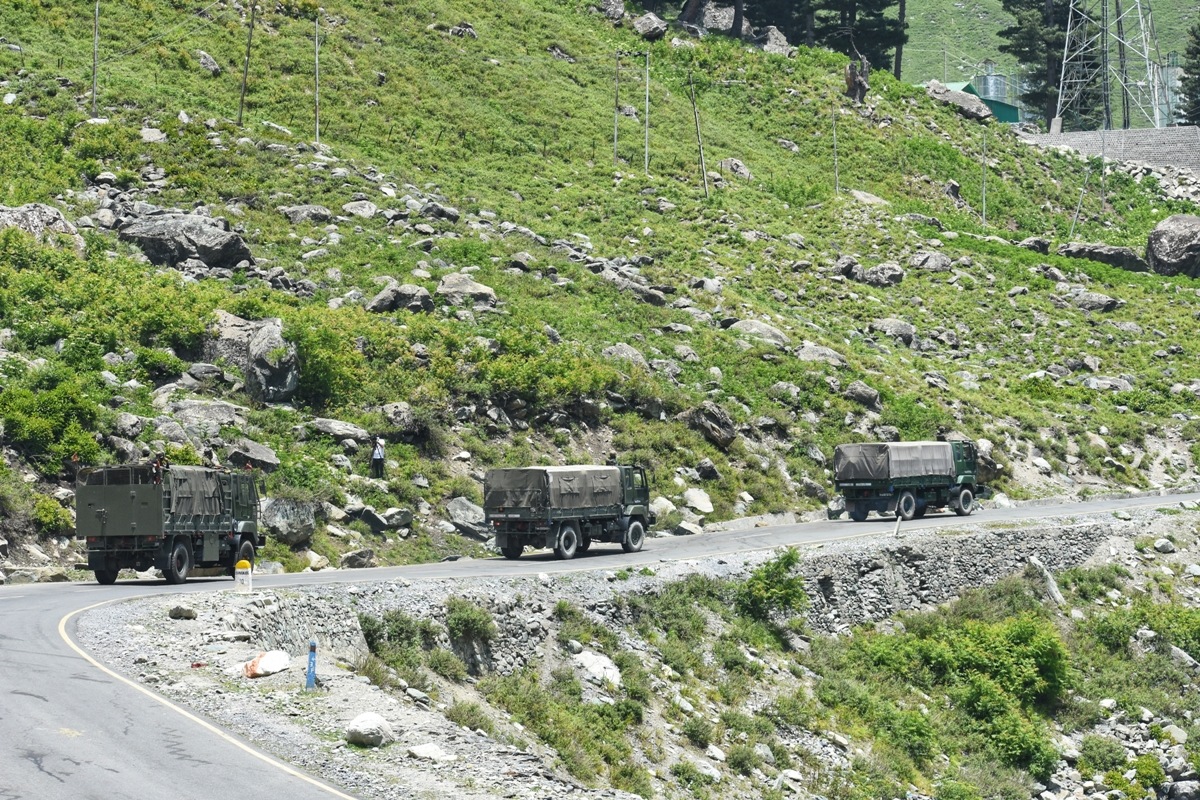It is not the size that counts but the size of the fight that counts – not only political will and military will, but also social will, writes Brig GB Reddy (Retd)
Power respects Power in the hawkish world of today. Power in all dimensions include: social power; soft power (diplomacy); hard power (military); economy; technology; and political will.
Lessons must be identified and defined not only from the above variables; but also from the adversary’s end objectives, ways and means – higher directions/ grand strategy and military strategy. Also, it is not the size that counts; but the size of the fight that counts – not only political will and military will, but also social will. Add to it, it quality but not quantity that counts.
Most importantly, Xi Jinping’s end-objective – “Chinese Dream” – is recounted as backdrop to include: “achieving the great rejuvenation of the Chinese nation: “Two Centenaries”; and “Four Comprehensives.” The “Two Centenaries” are specific: by 2021, when the CCP celebrates its centenary, complete the building of a modern socialist country that is prosperous, strong, democratic, culturally advanced and harmonious in all respects, with a strong military to make China the world’s dominant power by 2049, when Peoples Republic of China (PRC) marks its centenary.
Napoleon Bonaparte in 1814 prophesied: “Let China sleep for when she wakes, she will shake the world.” Xi Jinping himself used a version of the quote in March 2014 speech in France (200 years later): “The lion that is China has awoken, but it is a peaceful, amiable, and civilized lion.” A former Colonel stated later, “China was once called the sleeping lion in the East, but now we have been awakened, and Xi Jinping is the leading lion of the lion packs, who dare to fight anytime.”
China is no more a “mystery wrapped in enigma. Xi Jinping wants to reclaim “Middle Kingdom” glory for China. So, its forays in all fields are expansionist. And, the policy\military strategy enunciated includes: “Creeping Incrementalism through Extended Coercion – interwoven with strands of suspense, suspicion, surprise and coercion is quite propitious – and “Salami Slicing”. Let none in India suffer from any illusions on the above count.
The PLA current policy is a follow through of three stages of revolutionary war – strategic retreat, strategic stalemate and strategic offensive. Thus, the present rapprochement for disengagement needs to be viewed with circumspection as strategic retraction borne out of stalemate for a more opportune time to launch strategic offensive.
On usual and scripted lines following bilateral diplomatic engagement – Special Representatives Talks – it appears all “hunky-dory”: “Both sides agreed to strengthen communication through the mechanism of the Special Representatives’ Meeting, hold Meetings of the Working Mechanism for Consultation and Coordination on China-India Border Affairs without interruption, consistently improve and strengthen confidence-building measures and prevent more incidents that undermine peace and tranquility in the border areas.”
National Security Advisor Ajit Doval and Chinese State Councilor and Foreign Minister Wang Yi spoke to each other and agreed “to ensure at the earliest complete disengagement of troops along the LAC” and “ensure a phased and step-wise de-escalation” from India-China border areas for full restoration of peace and tranquility”.
The four areas of de-escalation include: PP 14 (Galwan), PP 15 (Hot Spring), PP 17 A (Gogra) and the Pangong Tso lake area (Fingers 4-8). The PLAs disengagement from “Fingers 4 to 8) will be the real proof at the tactical level. “Buffer Zones”, reduction of size of patrols and troops close to the LAC also to be implemented.
What about the strategic or theater operational art level – “disengagement of troops along the LAC”? After all, 2 Mountain Divisions of the Tibet Military Region and the Combined Arms Brigades have been mobilized and deployed as strike formations in their forward postures or bases poised to launch offensive strikes. Also, it must include the Air Force units to include fighters, helicopters, drones and other force multipliers.
Very little intelligence is in public domain concerning PLA postures in Central and Eastern Theaters to include Naku La in Sikkim. Thus, to view the above agreement as a great breakthrough mercilessly exposes blinkered or myopic view of geopolitics and mid and long term strategic affairs.
If “Differences should not become Disputes”, then not only “de-escalation” at the LAC, but also “disengagement” of all strike forces deployed in “offensive launch pads” must revert to their peace time stations – to usher real peace and tranquility at the LAC.
So, what are the lessons to be culled out from the recent developments? No need to convene a “Committee or Commission”. Experts have been highlighting the key requirements time and again in all dimensions on the visual and print media to include:
– Intelligence – Satellite coverage 24×365 by dedicated military satellites of the Indo-Tibet border; need for instant flow of intelligence from nations with whom agreements exist; and forge partnerships with other nations for sharing of intelligence.
– Hard Power (Security Forces) Reforms:
1. Indo-Tibet Border Guarding Forces:
-
- ITBP (60 Battalions) to be converted as two Infantry Regiments each with 30 battalions (under the Indian Army Ministry of Defense) and designated as Ladakh Regiment and Arunachal Regiment.
- SSB (73 Battalions) to continue under the Ministry of Home to guard the Himachal and Sikkim-Indo-Tibet Border, UP-Nepal Border and Indo-Myanmar border.
- Reassign and Redeploy over 40 Assam Rifles Battalions to guard the Arunachal Pradesh-Tibet border instead of ITBP under the Indian Army;
- Recruitment to the Ladakh and Arunachal Regiments from locals due to their high altitude warfare compatibility; and,
- organise local guerilla/militia groups along the Indo-Tibet border:
2. Indian Army:
- Present 17 Corps designated as Mountain Corps to be located in Northern Command and integral Task Forces Divisions located in Leh and at suitable location on Manali-Leh Road (through Rohtang Pass).
- Raising of Second Mountain Corps by regrouping for Eastern Theater to be located in mountains.
- Fast tracked indigenous production of guns and long range ammunition.
3. Tri-Service Command, A & N Islands: Immediate development of Campbell Bay and Nan cowry islands as Air Force and Naval bases for SU30MKI/TEJAS and Submarines with Surface to Air Missiles and Brahmos Shore-to Ship based missiles.
4. Air Force:
- Fast-paced indigenous production of SU-30MI, Rafael’s, Tejas MK1A and Mk2 by round the clock work; and design and development of Stealth fighters pending which acquisition of F-35s.
- Fast-tracked acquisition of S-400 Missile Systems from Russia and deployment in Ladakh.
- Indigenous production of ASTRA and Brahmos BVVRM missiles for jet fighters.
5. Navy: Fast paced indigenous production of submarines and other ships on order.
The list is suggestive for expeditious action by the political hierarchy; and not all inclusive. Financial constraints cannot anymore delay them. Even the three services of the Armed Forces must impose “Ban/Freeze” under the Head of “Major/Minor Works” like buildings, roads and compound walls to save every single rupee to meet operational needs.
What about strict austerity to be observed by the Presidents Estate, PMs and other VIP entourage extravaganza, and the Chief Ministers and State Governments outrageous expenditures on high-fly projects. The States too have to observe strict control over financial extravaganza for the sake of modernizing armed forces.
Social Power: Criticism by the opposition parties highlighting frivolous reasons in times of “War-like” situation on the borders is contra national unity. To stem the rot of internal social divide, the ruling party may like to convene the Parliament session and discuss in detail the present situation and the details of projected requirements. Also, there is a need to counter effectively the “influence operations” carried out by adversaries.
Economic Power: The temporary ban on trade, particularly on the “Digital Front”, may appear quite insignificant; but when viewed in the overall context of trade war against China by the US, Japan, and others, it is quite rattling for China. In no way, the central government should lift the ‘bans or restrictions” on trade. Instead, the ruling regime must encourage and financially aid local trade agencies and start ups to actively enhance their capabilities.
Technology Power: India remains a laggard although claiming to be having a “large scientist pool” of young qualified personnel. Departments like the ISRO, DRDO, IIS, IITs and other institutions must in cooperation with private enterprises must design, develop and indigenously produce high-tech innovations in all fields. No use in boasting to be a “Software Power”, when the country stands outsmarted by the Chinese counterparts.
Finally, political will expressed episodically is certainly good, particularly to boost the morale of the troops on the front line, but needs to be matched expeditiously by breakthroughs in all other variables of national power. The critical Chinese Centre of Gravity lies in the Andaman and Nicobar Island region straddling the Great Channel through which nearly 80 percent Chinese trade transits. Rapid military infrastructure development is of utmost significance.
It is also high time for Prime Minister Narendra Modi to personally visit all science and technology units to ascertain their status and direct them to deliver on ‘time-bound” basis. After all, today we are living in “Technology Age”. Unless the scientists innovate, design and deliver in a time-bound manner and technologists accelerate the transfer of technologies simultaneously to private partners, India will remain a laggard which is contra national security interests.
The views expressed here are the writer’s, and do not necessarily represent those of the Publisher and Editors of Seniors Today





Comments are closed.